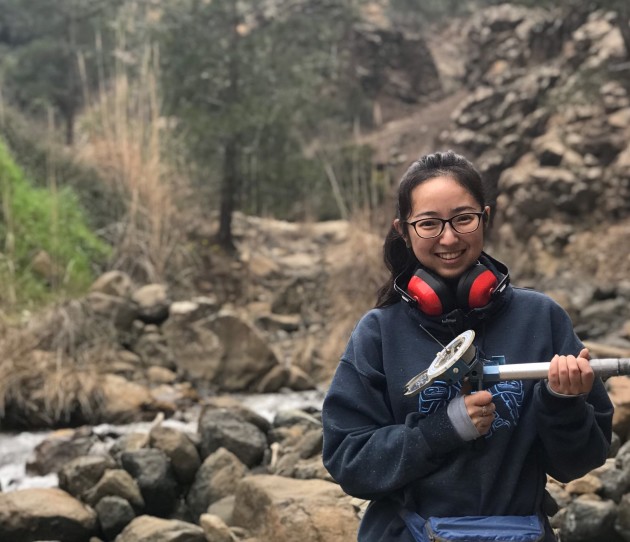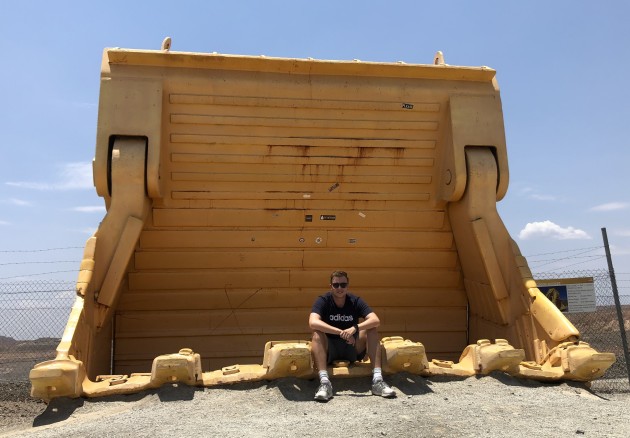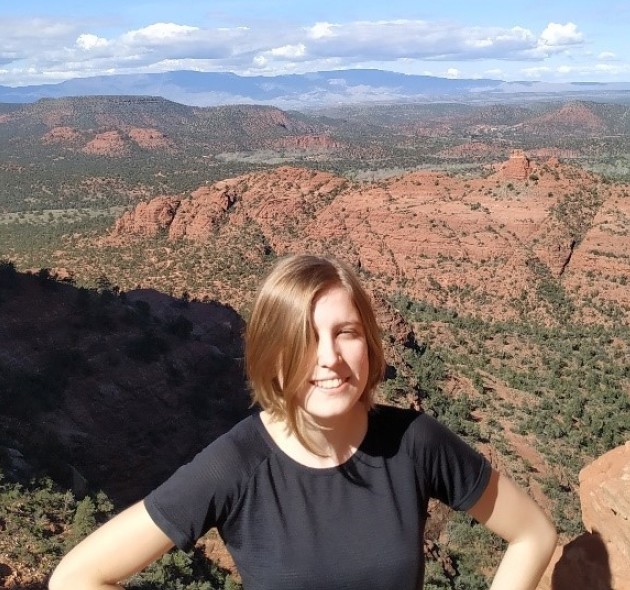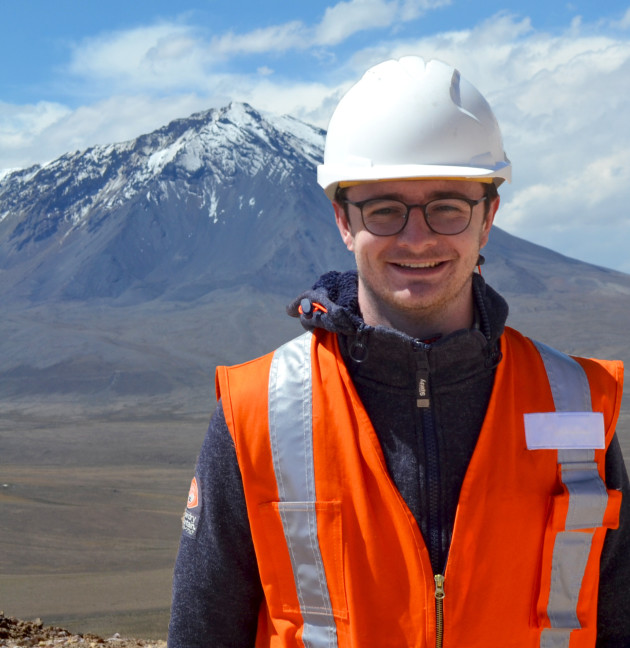 Annie Mao - 4th year, MSci Geophysics, having done A-levels in Maths, Further Maths, Physics and Chemistry.
Annie Mao - 4th year, MSci Geophysics, having done A-levels in Maths, Further Maths, Physics and Chemistry.
As a geophysicist, I enjoy the practical side of my degree the most. Modules such as Global Geophysics and Seismic Techniques illustrate the applications of geophysical theories. We also get to go on a geophysics-focused field trip which is the best field trip of my degree!
At Imperial, there are many opportunities for you to develop academic and personal skills. For example, I took part in the Undergraduate Research Programme Opportunity where I worked with a geochemistry team as a research assistant for 8 weeks in summer.
I’m also involved in many activities in clubs and societies. Our department and the Materials department form the Royal School of Mines Union. I have been a team member of the RSM Badminton and Lacrosse Club for 3 years. I was the secretary of the badminton club in my second year, where I really enjoyed working with my fellow committee members and the student union. Because of this positive experience, I volunteered as the Vice President Clubs & Societies (VPCS) in the RSM Union in my third year. As VPCS, I represented RSM clubs and societies on the Imperial Union board. I also organised the 118th Bottle Match, which is the second oldest student-led sports varsity between Royal School of Mines and Camborne School of Mines.
Taking part in these activities built up my confidence in my time management, teamwork and project development skills. In the summer between my undergraduate study and 4th year MSci programme, I secured an internship with BP as a geophysicist working with a North Sea exploration team.
I highly recommend this course because it is a well-structured programme with supportive lecturers and staff. The Department is an extremely tight community of passionate people who are always friendly.

James Stringer - MSci Geology, having done A-level Biology, Chemistry, Geography and Business Studies
“The numerous field trips are without a shadow of a doubt, the most memorable times of your degree at Imperial. I was fortunate to travel to nine different countries during my time in the Department of Earth Science and Engineering, including Ghana for my MSci project, where I worked and lived on one of the world’s biggest gold mines for six weeks - an experience I will truly never forget. It was this opportunity that ultimately led me to move to Australia to work in this sector after graduation.”
The Royal School of Mines (RSM), with its Union for Earth Science and Materials students, is well known for being very social and they have some of the best clubs on offer. I was a member of RSM Football for three years and was fortunate to be a part of the Bottle Match winning team 2019 (arguably my biggest achievement to date!).
I was also a member of the Society of Economic Geologists (Imperial SEG), which allowed me to participate in a field trip around the Peruvian Andes, looking at different mine sites and learning more about the industry as a whole.
I feel I developed into a well-rounded young professional during my time in the Department of Earth Science and Engineering. The highly technical components of the course and the ability to be taught by some of the best lecturers and professors in their respected fields in the country make this degree unlike any other in the country. Not to mention the teamwork, work ethic and interpersonal skills that are tested, especially during fieldwork.
I am currently working in the mining sector for Northern Star Resources, Australia’s second-biggest gold producer, in Kalgoorlie, Western Australia. As an underground mine geologist, I spend the majority of my time working underground at depths of up to 1.3km below the surface, mapping and sampling the geology to provide a better understanding of the gold deposit and to help maximise the amount of gold we can mine. My role is extremely varied and fast-paced, requiring both fundamental geological skills and personal skills such as time management, communication and leadership.
Something that probably sums up the culture of the RSM is what happens during fieldwork. By day you’ll be working hard, testing ideas, debating lecturers about how theory applies to what you see first-hand in the natural world, by night, you’ll be arguing over who’s better at pool! It is this close relationship you're able to form with the lecturers that make your time at Imperial so enjoyable.
Put simply, the RSM is what you make of it, the more you put in, the more you’ll get out (by the bucket load)."
 Eliza Karlowska - Graduate, MSci Geophysics with a Year Abroad at UC Berkeley, having studied towards Polish A-level equivalent “matura” exams.
Eliza Karlowska - Graduate, MSci Geophysics with a Year Abroad at UC Berkeley, having studied towards Polish A-level equivalent “matura” exams.
having studied towards Polish A-level equivalent “matura” exams.
"I took standard level exams such as Polish language/literature, Mathematics and English. I also studied Mathematics, Physics, Geography and English at an advanced level. I never studied in English before but it was relatively easy to adapt during the first term at Imperial.
One of the highlights of the degree were field trips abroad. As a geophysicist with no geology experience, it was amazing to see my knowledge applied in the field. Our cohort was small so it was a great bonding exercise to spend time in the field together. During year 2 trip to Cyprus, we had an opportunity to work with professional equipment to investigate a few localities. It was very satisfying to unravel what’s beneath our feet with data collected ourselves in the field.
However, I cannot ignore how amazing academic staff are in ESE. We are a small department, so many academics know students by their name, which creates a very welcoming environment. I always found my lecturers friendly and eager to help, and there was always support whenever I needed it.
Imperial has plenty of societies that you can join, whether it is an academic, sports, entertainment or a cultural society. Societies are definitely the best way to meet friends outside of your cohort and halls. I have tried many societies over the years, e.g. sci-fi and fantasy society with a library hidden beneath Beit Quad; DramSoc, a theatrical society where I got involved in backstage activities such as lighting design; Robotics Academy, a society providing Lego workshops for school kids to promote STEM; and plenty of sports societies (e.g. netball, volleyball and ballroom dancing).
Being at ESE has definitely shaped my career over the past four years. It started in year 1, after a programming course in Python which I absolutely loved and made me desire a future job that involves coding. During one of my lectures, I got interested in a video of a numerical simulation and I reached out to an academic for a summer project to learn about this subject more. Little did I know that three years later I would have completed three fully funded summer projects and an MSci project with the same supervisor who I anxiously emailed in year 2.
During the summer projects I realised how much I like working as a researcher, but I was not convinced that I could dedicate 3.5 years of my life to a PhD. My decision was influenced by the year abroad scheme that enabled me to spend my third year at University of California, Berkeley. The highlight of my year abroad was working in a research group on a year-long project, which gave me an opportunity to publish my work. I am very grateful for these opportunities, especially that Imperial showed me how suitable a research career is for me.
When I finished my degree, I got involved in a summer StudentShapers project that aims to create programming resources for students in ESE to aid the curriculum in a form of an interactive website. From October, I will be starting a PhD at the University of East Anglia in coupled atmosphere-ocean models in collaboration with the Met Office.
I would absolutely recommend my course to anyone who likes maths, physics and programming. It is an intellectually stimulating programme, with a very welcoming and friendly environment and excellent staff members, always ready to help. I would recommend this course to people who like theoretical work applied in real life, especially to earth science problems. The course gives plenty of transferable skills that can be easily used in jobs outside of earth sciences."

Sam Casement - Graduate, MSci Geology, having done A-levels in Biology, Chemistry and Maths.
"I was somewhat apprehensive coming into the course having no geological experience but I really had nothing to worry about. First year is there to get you all up to the same standard. Many students haven’t studied Geology before, and students who have may not have taken another subject such as maths or one of the sciences. Everyone will fill the gaps in their knowledge. Then, in upper years, you advance into more complex areas which you have been well prepared for, so you can really get the most out of the degree!
My favourite part of the course has to be the fieldwork. During the degree we get to travel to some amazing places, see world-class geology and learn from some of the leading geologists in the world, all whilst being with your friends! It is definitely hard work, applying all the knowledge you have been taught in lectures to the real world (which is never quite as simple as the model you are told about!), with some long days in the sun (or pouring rain…) but there is always plenty of time to grab some drinks at the end of the day, head to the beach and more often than not – both. It is also a great time to get to know your lecturers. The department is so friendly and all the staff are incredibly willing to pass on their knowledge and help you out any way they can. Get as much out of them as you can because four years comes and goes really fast!
During my degree I was really involved in all things Royal School of Mines (RSM). Once you arrive you will learn very quickly that they are a big part of Departmental and College life. I held a number of positions within the RSM but also played in the sports teams as well. I captained the tennis team, played in lacrosse and reformed the cricket club. The teams are normally very casual but they all build up to play in Bottle Match – our varsity against the Camborne School of Mines. This fierce rivalry happens in February every year, either in London or Cornwall, and it is my favourite weekend of the year. Everyone turns up to support each of our sports teams and celebrates all things RSM. You’ll probably hear me on the megaphone shouting support to the RSM when I come back to watch.
I am hoping to enter the mining industry (due to COVID-19, travel is on hold) but when I arrived at Imperial I had no idea what I wanted to do! I think most people start in a similar situation, or they had an idea when they started that has since changed and evolved throughout their time here. My real passion for mining came when I went on Imperial’s Society of Economic Geologists (SEG) field trip to Peru (pictured) in the summer of my third year. We spent two weeks with industry experts exploring some of the world’s biggest and best mineral deposits. Learning about how the mining industry works, from exploration to production and all the way through to mine closure, whilst exploring a new country was one of the best experiences of my life. The trip was heavily subsidised as it was sponsored by both Imperial and industry partners and would have been something I could never have afforded on my own.
This summer after finishing my final year, I have been interning at an exploration geology company based in Mongolia. I have been advising contractors in the field on their drilling campaign as we look for gold, copper and silver. This role appeared on JobsLive – Imperial’s job searching platform that you have access to during and after your degree. I have also been involved in the Department to help them prepare for remote teaching next term. Two other graduates and I have been digitising the Department’s rock library. We have been 3D scanning rock specimens to use in remote lectures. It has been a great experience for me, getting to see all of the best specimens in our collection and now you get to as well!
My time at Imperial has been amazing and I could not recommend doing Geology at Imperial enough. You get to combine maths and the sciences into one subject and get to explore the world at the same time! The amount of contact you get with lecturers, who are at all the forefront of their fields, combined with the supportive environment in the Department makes it such an incredible place to learn. My biggest piece of advice to get the most out of the degree would be: get stuck in! Get involved as quickly and as much as you can, I promise you won’t regret it! If I had the chance, I would do it all over again! I look forward to meeting you at an alumni event or in the Union Bar on a Friday."